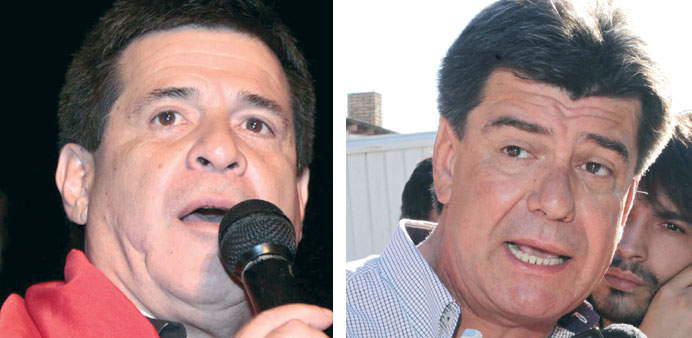|
Paraguayans are heading to the polls on Sunday to end the impasse that has bogged down the country since president Fernando Lugo (2008-12) was impeached 10 months ago. |
The two top candidates represent the parties who controversially moved to oust former bishop Lugo in a speedy impeachment procedure in June 2012 and replaced him with then vice-president Federico Franco.
Horacio Cartes, 57, the candidate of the Colorado Party which led the country since the days of dictator Alfredo Stroessner until Lugo’s election, was regarded as the sure winner until a few weeks ago, with a lead of around 10 percentage points according to opinion polls.
Efrain Alegre, 50, the candidate of interim president Franco’s Liberal Party, braced his chances last week through an alliance with the nationalist Unace.
Unace’s candidate, former coup leader Lino Oviedo, died in a helicopter crash in early February.
Cartes has charged corruption, saying the political alliance resulted from the purchase by the state of almost 6,000 hectares of land formerly owned by leading Unace politicians for about $11.5mn.
The government is “plundering” state funds for personal enrichment and political purposes, Cartes charged.
Franco denied the charges of ties between the purchase of lands and party politics.
Rather, he stressed, it is linked to a development policy passed by Congress in order to grant land to poor farmers.
The agrarian issue remains a cornerstone of Paraguayan politics.
Around 42% of the population of the landlocked South American country lives in rural areas, about half of them below the poverty line.
The as yet unsolved case around the deaths of 11 squatters and six police officers in clashes in June 2012 in Curuguaty, 200km from Asuncion, triggered the procedure to impeach Lugo, who had by then lost much of his popularity and virtually any congressional support he once had.
After Lugo’s exit, Paraguay was suspended from membership of both the South American trade bloc Mercosur and the Union of South American Nations (Unasur), since the country’s neighbours thought the impeachment was in fact an “institutional coup”.
Paraguay is expected to be re-admitted to both groups at the latest after the new president is inaugurated on August 15.
Cartes is a wealthy landowner and businessman with more than 3,000 employees. He only became active in politics in 2009, and his government programme can be summed up in the need to “steal fewer state funds”.
Cartes has been for years the president of the popular football club Paraguay and therefore is well known among fans of the sport.
In recent days, he made headlines when he compared homosexuals to monkeys.
His rival Alegre has accused Cartes of having ties to drug money and the smuggling of cigarettes into neighbouring Brazil and Argentina.
Alegre has taken on portions of the reform programme of the Lugo administration. However, he continues to be plagued by ties to the interim government.
In a distant third place, according to opinion polls, stands leftist candidate Mario Ferreiro, of the Movimiento Avanza Pais, with about 10% of the votes.
Lugo himself is a candidate for a seat in the Senate.
More than 300 international observers deployed by the Organisation of American States (OAS), Unasur, the European Union and other institutions are to keep watch over the election.
Around 3.5mn people are registered to vote in the country of 6.6mn, to pick in a single round of voting a president and vice-president, and members of Congress and governors, among others.

